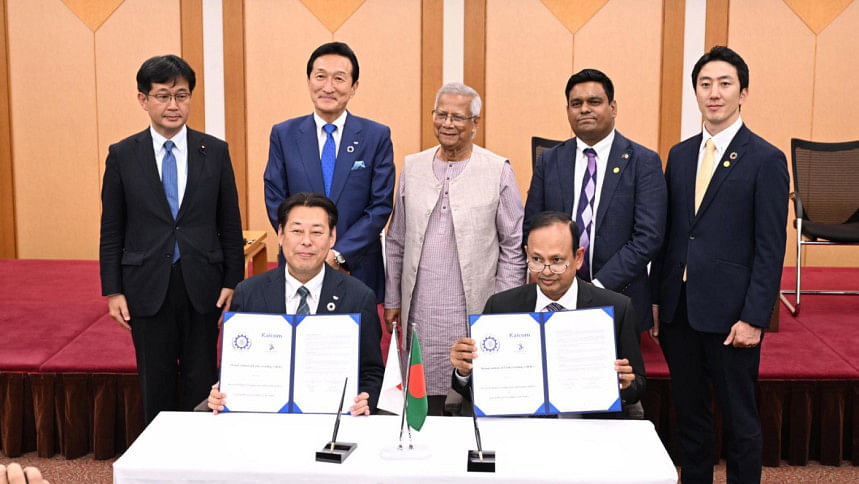Japan to recruit one lakh workers from Bangladesh

Japanese authorities and businesses have announced plans to recruit at least 1,00,000 skilled workers from Bangladesh over the next five years to address Japan's growing worker shortage.
"In the coming five years, we are prepared to welcome more than 1,00,000 Bangladeshi workers," said Mikio Kesagayama, chairman of Japan's National Business Support Combined Cooperatives (NBCC), a federation of over 65 companies.
He was speaking at the "Bangladesh Seminar on Human Resources" organised by the Bangladesh Embassy in Tokyo.
Chief Adviser Prof Muhammad Yunus also attended the seminar after participating in the Nikkei Asia Forum.
"This is the most exciting and inspiring day for me. This will open the door for Bangladeshis not only to work but also to know Japan," he said.
Prof Yunus witnessed the signing of two MoUs -- one between Bangladesh's Bureau of Manpower, Employment and Training (BMET) and Kaicom Dream Street, a Japan-Bangladesh joint venture; the other between BMET, Japan's NBCC, and the Japan Bangla Bridge Recruiting Agency (JBBRA).
"This gathering is about opening the door," he said, noting that Bangladesh has a population of 180 million, half of whom are under 27.
Bangladesh Ambassador to Japan Daud Ali said by 2040, Japan's labour shortage could reach 11 million, creating a major opportunity for Bangladeshi workers.
As of 2024, about 35,000 Bangladeshis work in Japan across sectors such as caregiving and hospitality.
However, a foreign ministry official told The Daily Star that Bangladeshi workers must learn the Japanese language and acquire specific skills.
"The wage level in Japan is good. The minimum monthly salary is equivalent to one lakh taka and higher for skilled workers. However, we haven't been able to train enough people," he said.
With the Japanese government and companies now directly engaging with BMET in language and skills training, trainings are expected to improve significantly, he said.
"Bangladeshi youths aspiring to work in Japan need to keep this in mind," the official added.
Mikio Kesagayama said his federation has long prioritised a quality workforce. "We look to Bangladesh for young, capable workers. They can contribute to both countries."
Mitsuru Matsushita, representative director of the Shizuoka Workplace Environment Improvement Cooperative, noted increasing interest among Japanese companies in hiring Bangladeshi workers. "Bangladeshi talents hold great potential. It is our duty to nurture them," he said.
Miki Watanabe, president of Watami Group, said a school they established in Bangladesh trains 1,500 students annually and plans to raise the number to 3,000. With technical education, students can enter Japan's job market, he added.
Hiroaki Yagi, chairman of the Japan International Trainee & Skilled Worker Cooperation Organisation (JITCO), noted that the number of language teachers in Bangladesh remains insufficient.
JICA FOR QUICK POLICY AND IMPLEMENTATION
Japan International Cooperation Agency (JICA) President Dr Tanaka Akihiko reaffirmed JICA's commitment to the Moheshkhali-Matarbari Integrated Development Initiative (MIDI) but stressed the need for faster decision-making to accelerate implementation.
He made the remarks during a meeting with Prof Yunus on the sidelines of the 30th Nikkei Forum: Future of Asia at the Imperial Hotel in Tokyo.
In response, Prof Yunus announced the plans to appoint a senior official to oversee MIDI projects and coordinate efforts with JICA and other foreign investors.
He urged JICA to enhance support for the MIDI to transform it into a key driver of Bangladesh's economic growth.
"The MIDI region represents the future of Bangladesh. With access to the Bay of Bengal, we are developing deep-sea ports, highways, and railways to connect it with Nepal, Bhutan, and other South Asian countries," said Prof Yunus.
JICA had originally proposed developing a deep-sea port at Matarbari. The interim government is now formulating a comprehensive plan to turn the entire MIDI region into a hub for ports, logistics, energy, and fishing.
"Our vision includes building a megacity in the region," Prof Yunus said, adding that airports are being upgraded to meet rising demand.
He also revealed plans to create free trade zones to attract foreign investment and establish manufacturing plants for export.
Additionally, the government aims to create an exclusive fisheries zone, allowing large vessels to operate in deep waters.
"Currently, vessels from neighbouring countries exploit these waters, while our trawlers are too small. By upgrading our capabilities, we can process the catch for both domestic consumption and export," he said.
Dr Tanaka remarked that this was perhaps the first time he had heard a Bangladeshi leader speak about deep-sea fishing initiatives.

 For all latest news, follow The Daily Star's Google News channel.
For all latest news, follow The Daily Star's Google News channel. 




Comments